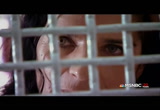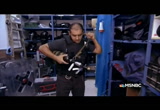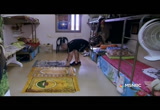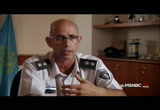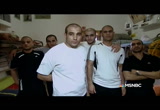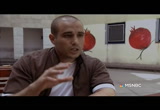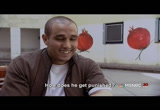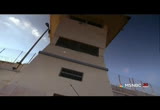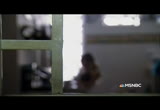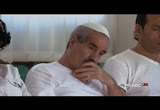tv Lockup World Tour MSNBC July 4, 2016 12:00am-1:01am PDT
12:00 am
press." ♪ ♪ ♪ ♪ due to mature subject matter, viewer discretion is advised. only slightly larger than the state of new jersey, israel is a country where the ancient world meets the modern. it is a nation of contrasts whose gleaming cities and resorts line one of the world's most volatile regions. where centuries old conflicts can explode into unthinkable violence. and those same countries are reflected in the nation's prisons. >> i am a bedouin, so you have to respect all the customs even if it is to die for the custom.
12:01 am
>> it's a place where muslims are held with jews, where organized crime families challenge correctional staff for authority, where nothing is taken for granted. >> translator: there was an event where a motorcycle passed by and threw a grenade in the direction of one of the guard towers. >> now three israeli prisons open their doors to our cameras, and we reveal unexpected sights inside. ♪
12:02 am
located on the mediterranean coast, tel aviv is the israeli version of the city that never sleeps. it is the nation's financial capital and draws millions of tourists each year. 30 miles to the northeast, however, is a considerably less popular landmark. rimonim, israel's largest maximum security prison. >> translator: the prison holds about 1,200 prisoners. here we have criminals convicted of murder, robbery, rape, and many serious things. that makes it a difficult place to manage. >> while state terrorists are segregated in other facilities, rimonim only houses inmates convicted of serious crimes.
12:03 am
as a result, security systems here are constantly evolving. >> translator: today we have the highest level of technology in israel, and the aim is to have the highest level in the whole world. we are always improving and always progressing. >> rimonim security system includes electrified fences, 700 surveillance cameras, a central system to control every door and gate in the prison, and an enclosed dog run where a canine corps patrols the perimeter 24/7. but a collection of confiscated shanks to rival that of any american prison proves there is little to stop inmates determined to commit violence. >> there is a greater risk of violence here, more than in a other prisons because this population, all in one way or another, has blood on their hands from outside. >> translator: i think that if you're trying to pick an average, there is a fight every week. in most instances they do use some kind of object.
12:04 am
it is either a shiv or sometimes even a shaving razor. >> but there is another factor at rimonim that keeps staff on constant alert. a violent inmate population mixed with political and religious tensions of the middle east makes for a potentially incendiary combination. >> translator: a few years ago there was an event when a motorcyclist threw a grenade in the direction of one of the guard towers. it was on the edge of the prison. we found out one of the inmates wasn't happy with the treatment he was receiving, so he gave the order to one of his henchmen to throw the grenade. >> translator: this month there is supposed to be the declaration of a palestinian state. we have residents from the occupied territories here as well as arabs from israel. and something can develop between the arabs and the jews in the wing. we have wings that are mixed with both minorities, and this could be the start of it.
12:05 am
>> while rimonim is always braced for violence, officials say, they control it by not only accommodating religious and ethnic customs, but by trying to make life relatively comfortable for its inmates. shoti, a palestinian muslim, serving life for murder, has done time at five other israeli prisons prior to rimonim. >> translator: when i came to this prison, i felt like i was in a hotel compared with where i have been previously. we have everything. nothing is lacking. we have a television. we have a radio, a cd player, dvds, fans, shelves, there is a cabinet where we put all our clothes. a shower. nothing is lacking. >> rimonim has both two-man and six-man cells, all of which more resemble college dormitories than american prison cells. and while most american inmates are not allowed to bring personal items beyond wedding bands or religious medallions with them, israeli inmates pack
12:06 am
their bags before coming to prison. >> translator: you bring everything with you when you turn yourself in, clothing, shoes, electrical appliances, cigarettes, hot plate, coffee, everything. you're allowed to bring everything. >> and for this man, who is serving 19 years for murder, the comforts of home go beyond material possessions. he shares his cell with three cousins and two brothers-in-law. and has other family living on the cell block, as well. >> translator: there are almost 20 of us here. it's normal. there is no problem with this. >> translator: there is no policy here that family members won't be together or that all the family members will be together so long as it doesn't threaten the order and the rules, it could be that we'll let members of the same family serve time in the same cell block, sometimes even in the same cell, if we feel it contributes to the inmate's security and to our security.
12:07 am
>> translator: you feel like you're at home. here we live together without all sorts of nonsense. >> translator: we take care of each other. >> while israeli citizens are muslims of arab ancestry, but they're not just any ordinary family. >> translator: the arabs are organized around known crime families, gangs. someone who belongs to one of these families will be more dominant. he's influential. he gets a lot of respect from the other prisoners. while this man is a very dominant presser who belongs to a very dominant family. >> when we walked into their cell, they greeted us, they offered refreshments, which we are not allowed to accept, but for me it was like being at the sopranos' house. it was just a very festive environment. it was a very social environment, but then you know that these people are capable of murder.
12:08 am
>> abu ganin freely admits to the murder that brought him to rimonim. >> translator: it was an assassination. my cousin was murdered. and in our family, it's a custom that if blood is spilled, it needs to be spilled on the other side also, so the guy was killed. i am a bedouin. my grandfather is also a bedouin. our customs are very strict. you have to respect all the customs, even if it is to die for the custom. [ speaking a foreign language ] >> translator: no, no, it's very hard, because with us, we respect the elders. that's basic. they say a word, it's holy. the truth is, my family is certainly proud. i told you already, it's our custom.
12:09 am
>> inside rimonim, the abu ganims have gained a reputation as a formidable crime family. >> translator: when i came to prison, everyone knew our story, which family i belonged to. we have a background, and we are a large family, a lot of members. there are almost of 20 us here. where we live, we have a very high status, and everyone respects us. >> i felt like i was in a film, in a scene like from "goodfellas," all of them spending time, cheerful, the family. they're cooking, they're proud. they carry themselves with a lot of pride for what they did. [ speaking a foreign language ] >> translator: we try not to put two clashing families together. we separate them to eliminate problems. >> they can't put two or three different families in the same cell block because everyone feels that's the top dog. that can escalate into a fight with very bad results. so it's preferable for them to put one family in each cell block. they manage their own affairs
12:10 am
and their people as needed. >> rimonim staff also sees a strategic advantage to keeping crime families together. >> translator: the moment that i have dominant prisoners in the cell block i know when needed how to send them a message that they have to be straight and keep their people in line. and when there is a crisis, i use them as a mouthpiece to reach the rest of the population. >> but abu ganim maintains he plays a larger role in the prison than merely a mouthpiece for officials. >> translator: at any second there can be a problem between inmates. and that can turn into a fight. if there is an argument, they have to come to us. we adjudicate, and someone who breaks the rules -- [ speaking a foreign language ] >> translator: -- gets punished. according to our language, according to the law. [ speaking a foreign language ]
12:11 am
>> translator: i prefer not to say. >> commander shin benderling has a different take on who maintains order in the cellblock. >> translator: we are the ones who maintain order, not the prisoners. even though they may say otherwise, there is a very clear organization. there are rules for behavior for order that are very clear, and the prisoners know them. >> coming up, inside rimonim's religious wing. a former israeli soldier recounts his role in a military gang rape. >> translator: i held a cocked gun towards him. >> we discovered the surprising benefit many israeli inmates enjoy. >> the idea of someone who had committed a violent crime and had a sentence, being released for a few days was really surprising to us. >> and later, we head north for an exclusive look inside israel's only female prison.
12:15 am
located 30 miles outside the modern bustling city of tel aviv, rimonim prison houses inmates from a variety of backgrounds and ethnicities. still there are plenty of reminders that it is located in the world's only jewish nation, a place where religion is paramount. one such reminder, the mazouzas, attached to every doorway. >> translator: it is a piece of parchment. we believe it protects the door and the place you enter. people here have fought for them to be on their door posts, so we do our best in the prison to have one on every room and public place so everyone who enters or exits will have this good feeling that there is somebody in the heavens to look after him. >> while most american prisons have chapels and offer some form of religious services, rimonim
12:16 am
has an entire housing unit devoted to the study and practice of judaism. [ speaking a foreign language ] >> translator: the religious wing is intended to provide an option for religious prisoners who request to, "a," live a religious life on a high level, and "b," to offer an inmate the ability to sit and study and develop on a spiritual level in order to offer him the tools of rehabilitation, not only during his imprisonment, but also after his imprisonment. >> inmates must apply to live in the wing and go through a probationary period to weed out those whose motivations are not religious. >> translator: the religious wing is a kind of sanctuary for a lot of the prisoners who do not get along with the regular inmates. so all of a sudden they want the religious inmates because they are more easy-going. there are inmates who only want to come to the wing because it is a good place, it's quiet. we only give this chance to
12:17 am
those who deserve it. >> one of the inmates who has been accepted into the religious wing is yoni kirchbloom. >> translator: once i had no idea about god and wasn't willing to hear such a thing that there was a god. >> kirchbloom was originally sentenced to six years for being an accessory to a sodomy rape of another male soldier during his basic training in the israeli army. >> translator: it took place at zakim army base. a few friends who were part of the case with me grabbed this one guy and i was actually the guard of the tent. and the other guys did what they did to him. and i just, i held a cocked gun towards him. and, in fact, i saw the incident and didn't prevent it. >> kirchbloom began his sentence under house arrest, but he then committed a robbery and was sentenced to an additional five years and sent to prison. [ speaking a foreign language ]
12:18 am
>> translator: as someone who was addicted to drugs, one of my things was a need for excitement. and today, in essence, the only excitement that i get here is through religion, through the torah, which gives me the tools that i need for life outside. >> in the religious wing, he is shielded from the potential violence between jews and arabs that exist in other parts of the prison. but some inmates at rimonim have benefited from putting the conflicts of the outside world aside. >> translator: to resist someone because he is a jew, a muslim, a christian, it simply doesn't work inside. >> shodi is palestinian. his cell mate is jewish. both are serving life sentences for murder. >> translator: we eat together. we play together. we work together. i love him a lot. he is better than a biological brother.
12:19 am
not everything you see on television works the same in prison. because in prison we are disconnected from politics. we do not deal and concern ourselves with politics. what interests us is our life in prison. >> given the situation outside, between palestinians and israelis, the animosity and conflict, i was actually very surprised to see how the two get together and actually became brothers. it was actually a pleasant surprise to see this. >> zoer discovered what a good friend kayir was 11 years earlier when both were housed in another prison. >> translator: i had an incident with a fellow jew. i stabbed someone who harassed me. as punishment they sent me to segregation. someone else came to mess with my things. shodi stood there and insisted nobody will touch my belongings. >> kayed even stood up to testify. a move that landed him in segregation as well. >> translator: we stayed together in segregation for six
12:20 am
months. and what he did for me i don't think anyone else would have done. coming up, how the unusual relationship between israeli prison staff and inmates even extends to the kitchen. >> the officers were not at all concerned about the inmates tampering with their food. >> and -- [ speaking a foreign language ] >> translator: we usually improve the food they give us. >> a young man faces decades in rimonim for murdering his sister. a family honor killing. >> translator: she met someone through the internet and i didn't like that.
12:23 am
located just outside tel aviv, israel's rimonim prison employs some of the world's most technologically advanced security systems. but even those can't always beat the street skills picked up by inmates like abed bakir. >> you know, sometimes i get to a place that it is forbidden to smoke. they say, don't smoke in here
12:24 am
with a cigarette. i said, okay. and they think that i throw it. it's in my hand. >> bakir's sleight of hand skills have proven useful in other ways as well. >> sometimes i show officers in the jail that i took their mobiles and they didn't feel so i give it back. so when i bring it back, they laugh and say thank you. they've don't have it -- another choice. >> but bakir is not in rimonim for pickpocketing. he is serving a 30-year sentence for murder, yet still has an easy-going relationship with officers whose cell phones he occasionally pilfers. >> having worked on "lockup" for a while now, the relationship abed had with the staff at rimonim was remarkable to me. there is still division between the officers and inmates. but there was just a friendliness about it. it was like watching two neighbors greet each other. they would shake hands. in american prison we don't see that. there is a lot more animosity from the inmates to the prisoners.
12:25 am
>> one reason why is that even though rimonim inmates are among israel's most violent criminals, rehabilitation is a major goal of the prison. >> i think that one of the keys of understanding the israeli prison system and why inmates live so comfortably with each other even in a maximum security prison, like rimonim, is understanding the size of israel. israel is a really small country. those inmates one day are going to return to society. and the prisons don't want to release, hardened, angry prisoners out there. because they will have to live with each other and they will have to live within the small israeli society. >> translator: we treat the prisoners in a respectful manner. we treat them as human beings. >> and nowhere is that respect and trust better demonstrated than in the staff cafeteria. corrections officers eat here every day. and the food is all prepared by inmates. >> the officers were not at all
12:26 am
concerned about the inmates tampering with their food. not a single officer expressed fear. they had complete trust, and they even were complimentary of the food. >> inmates also cook the three daily meals provided to other inmates, but most rimonim inmates, including wadi abu amar, cook for themselves with the food they purchase from the canteen in kitchens located in housing units and in some cases inside individual cells. [ speaking a foreign language ] >> translator: the food is -- reasonable. let's put it like that. we don't like everything. we usually improve the food they give us. they bring, for instance, turkey breasts sometimes. we take it, make it with onion, mushroom, vegetables. make it like a stir fry. i'm cutting with a piece of metal because we don't have knives here. knives are forbidden. so we improvise.
12:27 am
i don't want the deputy to see me. >> seeing abu amar and his friends cooking in prison made it seem like we were in a fraternity house rather than a maximum security prison. he was always laughing and playing around with his friends in the cell. but when we asked him to speak about his crime, that brought us back to the reality that we are in a maximum security prison, and we are dealing with a different set of cultural issues. >> abu amar is serving 27 years for murder. the victim was his sister, and the crime was considered a family honor killing. >> he grew very serious. he told us it was the first time he has ever spoken about his crime.
12:31 am
12:32 am
family honor killing which, until now he has not publicly spoken about. [ speaking a foreign language ] >> translator: i am serving time for the murder of my sister. it is something that is hard for me to talk about. it is something very sensitive for me. >> abu amar says he shared a close bond with his sister, who at 22 was only a year older than he was when he killed her. >> when we asked him to speak about his crime, he grew very serious. his whole demeanor changed. he asked to clear the room of his friends. he asked to shut the door closed. he said this is the first time he will speak about his crime in such details. [ speaking a foreign language ] >> translator: she met someone through the internet, and i didn't like that. i said, if the man has good intentions and all that, let him come to our house. everything will be fine. she continued with it. and i opposed that until one day i raised my hand on her.
12:33 am
she went to the police and made a complaint. they took me, questioned me. and since then, she didn't return home. they took her to a shelter for battered women. and three years passed like that. >> but abu amar says his extended family felt his sister's actions shamed them and that she deserved to die. >> translator: my uncles and all that, they put pressure on me. they decided that because of me this problem happened, and i need to do it, only me. i come from a bedouin family. and for the bedouin it is not allowed to disrespect the family honor. she disrespected the family honor. in order to return the honor of the family, it was necessary to kill her. [ speaking a foreign language ] because she talked with a guy, and she also ran away from home. >> it took months, but abu amar
12:34 am
eventually located the shelter where his sister was staying. and lured her to him. >> translator: i tried to set up the meeting with her in a quiet place with no people, and that's where i kidnapped her, and i killed her. >> abu amar says his actions still haunt him. >> translator: i miss her a lot. a lot. there isn't a night that i don't think about her. i have other sisters, charming, most of them married. they come with their children to our house, sit, happy. we have a warm and loving home. she could have been there, too.
12:35 am
>> today, abu amar is housed in the domestic violence therapy wing of the prison and is receiving treatment and dealing with the consequences of his crime. >> translator: when he arrived he was a bit more introverted. now he seems like a different person, a person who is more open, talking, laughing more. [ speaking a foreign language ] >> translator: our main function is to watch over the prisoners that the court has decided to convict in accordance with our legal system, but this isn't the only thing we do. we also need the imprisonment to be secure, pleasant, and in good conditions. in order to return them to the community and society as changed people. >> and that commitment to rehabilitation is reflected in the name of the prison itself. rimonim is hebrew for pomegranate. [ speaking a foreign language ]
quote
12:36 am
>> translator: it's a fruit that contains many seeds. it demonstrates unity, being together. there are positive prayers in judaism that say may we have as many privileges as a pomegranate has seeds. the name was chosen after a strong fruit that symbolizes goodness and with the hope that we will always symbolize goodness in this facility. >> rimonim is not the only israeli prison whose name holds a special meaning. there is only one prison in the entire nation that
12:37 am
>> we have all types. long sentences, short sentences, minors, old women. everybody is here. every kind of crime you can think of, murderers, sex offenders, drug dealers, white collar. >> you have white-collar criminals with someone who has committed murder? >> right. >> like rimonim, neve tirza also places an emphasis on rehabilitation. and in certain areas could be mistaken for a college campus. but to inmate shome, who shares a six-person,
12:38 am
>> she is serving a two-year sentence for stabbing her ex-girlfriend's new lover with a penknife. >> translator: i have no idea how this happened. i think everybody has that fut that waits to flare up. if it happened to me, it can happen to anybody. >> she stands out among other inmates because of her tattoos which are forbidden by judaism. >> translator: i have this one, which is, say my name, bitch. it was in "american pie." from a movie. i almost died laughing. i am a silly person like that. so i did the tattoo. >> banisti also stands out for her popularity with other inmates. she says she had never been in trouble with the law prior to coming to neve tirza but was able to make herself at home here. >> translator: after about a month, i think, i became the queen of the wing.
12:39 am
i do a lot of things here. first of all, i have a job. i serve the food to people here. so you already have contact with everyone. i also help with the education, and i sing and dance. and as soon as i start dancing, everybody comes to me and says, teach me. teach me. i want to dance. and besides that, i'm a lot of fun. i'm funny. my prison time goes by like that. so i make it smooth for other people, too. >> neve tirza not only has a rec room for dancing, it has one other unusual facility. one we have never seen in any other prison. a petting zoo. >> what we found is that the treating of animals is something very therapeutic for them. some of them were victims, their parents' victims. so that helps them deal with those issues. people who have violent offenses learn how to be gentle, and they
12:40 am
learn how to respect a living creature. and there is a darkroom in there. there is a comfortable chair and an aquarium with fish that glow in the dark, and it's supposed to be a place for relaxation. [ speaking a foreign language ] >> translator: something inside of me really enjoys the silence because for many, many years i lived in a very difficult and emotional storm. >> balita sabet is serving 25 years for aiding and abetting murder. she and her boyfriend killed an elderly woman during a robbery. they were drug addicts and needed a fix. [ speaking a foreign language ] >> translator: i brought the rope that he used to tie her hands. i held her mouth with a shirt when he stabbed her. afterwards i cleaned all the fingerprints. >> sabet has been in prison for more than nine years and says she changed during that time and
12:41 am
that the petting zoo has played a large role. >> translator: everyone connects to one of the animals. me, it's my bird. he reminded me of myself. he was really aggressive. just like i was when i came here. he used to attack. he just took out flesh from the girls. and with me, somehow we found a common language. and now we have a love affair. and the fact that i come and take care of them, it's a responsibility. >> sabet's progress in prison made her eligible for one of the more surprising privileges available to israeli inmates. they call it vacation. but it's actually a furlough program that allows inmates to leave the prison and stay with approved relatives up to several days at a time. sabet visits her sister. >> the idea of someone who had committed a violent crime and had a very long sentence being released for a few hours or few days was really surprising to
12:42 am
us. but the focus in the prisons was on rehabilitation. and the idea of vacations is to help reintegrate inmates back into society. [ speaking a foreign language ] >> translator: now i go out every 21 days. i have leaves of three days. i love every moment. i love tastes. i love food. i love the experiences, the smells, people. they look at me in a different way. they don't see a person with horns. they see me as a human being. >> coming up -- >> translator: playpens, cribs for babies, strollers, they paint for us and drew for us and they really put in a lot of effort. >> motherhood in prison. and later -- >> i have never heard you describe yourself as wrong. >> it's not like i stabbed her and then left. >> a 73-year-old inmate tries to make sense of his crime inside one of israel's most unusual prisons.
12:46 am
locked behind the gates and razor wire of neve tirza, the only women's prison in israel, are three people who are unquestionably innocent. >> right now there are three children here. one was brought here with the mother when she was arrested. two of them were born here. the mothers were arrested when pregnant. they gave birth here. they live here with the babies. >> at neve tirza, babies can stay with their mothers until they turn 2 years old. pregnant inmates are released to civilian hospitals to give birth but then must return as soon as
12:47 am
they are able. maria is here with her 2-month-old son. >> translator: we don't feel that we are in prison here in this room. it is very different from the rest of the rooms. playpen, cribs for babies, strollers. they painted for us and drew for us and they really put in a lot of effort. we're comfortable. it's pleasant for us. >> still samolovich says being a mother in prison is difficult. >> translator: the truth is, it really is heartbreaking. you look outside the window, you see even a tree, a car, noises that you are used to. they're not here. you are isolated. it's really, really painful. really. >> samolovich was one month pregnant when she committed the crime that led to her four-year sentence for assault with a deadly weapon. she stabbed a young woman, her former roommate, in the neck and face during a heated argument about an ex-boyfriend. [ speaking a foreign language ] >> translator: i don't have the strength to explain it really.
12:48 am
it's long. it's complicated. in short, it was a case of jealousy. >> this is not her first involvement with prison. she was conceived in a russian prison during a conjugal visit between her parents. >> translator: my father was addicted to drugs all his life. and his whole life from the age of 12, he goes out, goes in, goes out, goes in, and when my mother gave birth, she was visiting him. her water broke. and when they went to the hospital, they let my father out of prison. it was the same when i gave birth. two guards, my father and my mother. >> if she participates in therapy and maintains a good behavior record, samolovich could be out of prison in a little more than a year. until then, she must cope with being separated from her boyfriend, the father of her child. [ speaking a foreign language ] >> translator: there is like no shoulder to lean on, you know, to tell him the child did this, did that, the child smiled.
12:49 am
it is impossible to share. sometimes i think if only he would see this, what he does or something like that. >> but the couple does have visits. >> translator: every two weeks a half-hour visit and once a month 12 hours, when we go to a room with a double bed, and then, you know. >> inmates who prove they're in established relationships may have one conjugal visit per month. >> translator: i'm a little bit stressed. of course, to go once a month for a conjugal visit is -- now. another half-hour. i don't think so. all he cares about is breasts. just breast milk. he still doesn't understand we are going to see daddy. poor guy, huh.
12:50 am
12:53 am
rehabilitation is a major focus of israel's maximum security prisons. such as rimonim and neve tirza, both of which are located near city of tel aviv. but in northern israel near the sea of galilee is another prison that officials say goes even one step further, hermon. it might be a prison but staff refer to it in different terms.
12:54 am
>> it's the largest therapeutic community in the country. >> this woman is a social worker. >> because hermon is a therapeutic community, we look at the inmates in a different frame of mind and we call them residents instead of inmates because they're in a community where we feel there is more respect for each other. >> the 600 men serving their sentences at hermon are divided into three residential therapeutic programs depending on their offense. there are wings for alcohol abuse, drug abuse and domestic violence. and everyone is required to attend daily group therapy sessions. physical activity is also encouraged. >> hermon was like being on a college campus.
12:55 am
there was a lot of freedom of movement. there were very few heavy doors. if it weren't for the razor wire and orange jump suits you would never know you were in a prison. >> translator: but this prison, don't make a mistake, it is a prison just like every other prison. there is a mantel of very strict security. we have fences. we have a canine unit. we have camera and television and closed circuit. we have patrols. we have a patrol on foot. and we have an outside vehicular patrol. >> even though hermon is centered around its therapeutic programs, officials here don't take them lightly. >> the treatment is not easy. it requires from them not only courage, but also desire, motivation. many prisoners break down and prefer to go to a normal prison in order not to stay and undergo pressures. those that complete the treatment usually are the prisoners we see integrate into
12:56 am
society and will not see them returning to prison. and those are the prisoners we want. >> it might be a tough road for this 73-year-old man, six months shy of completing his four year sentence. today is family day at hermon. and for the prisoner it is a chance to repair his relationship with his children and grandchildren. his family was traumatized after he stabbed his wife several times during an argument in which he was drunk. his wife survived the attack. but is not here today. >> translator: i have to tell you that one of the things that is so special about family day is the opportunity to see all of you with a child in your arms. to see this family connection is simply critical. >> he only recently entered the alcohol treatment program. >> translator: coming to terms
12:57 am
with what you did isn't just about whether your family accepts you or doesn't accept you, the question is whether you are able to stop and tell them i acted in a violent manner. i stabbed, i drank. >> i already said that. >> translator: you think everything is all right if they sit next to you. >> it is enough. admit it. we can go on. everybody will love me. everything will be okay. >> she says that his rehabilitation must begin with him accepting responsibility for his actions. it's been an uphill battle. >> translator: i have never heard you describe yourself as wrong. >> translator: it's not like i stabbed her and then left. >> translator: what does that matter? you stabbed her. >> translator: i stabbed her. but i don't want to be responsible for her having to go to the hospital. >> my mother is fine. thanks to god. >> she is one of his eight children. >> she was stabbed in the back and in the stomach. everything is all right. she lives with me.
12:58 am
but he is still my father. i have to support him. because i know how he raised me. what he did for us. and he did everything for us. he is a warm grandfather. he spoils his grandchildren. and it is very hard for him. but it is hard for all of us. it is an event that ruined the family. it is a nightmare for us. >> at his advanced age it is difficult to say what his life will hold in store for him when he is soon released. but this 34-year-old is optimistic about his future. he holds an inmate job at the hermon prison shoe factory. >> translator: it is a privilege to work here. >> he is serving two and a half years for drug dealing and domestic violence against his girlfriend. >> translator: he arrived in the community very much afraid with no confidence. he only knew violence and how to react in violence.
12:59 am
he had no way of expressing his feelings. he didn't even know how to describe what he felt. it was kind of -- i would say very hollow inside. a lost soul. >> he says his therapy in hermon helped him rediscover the one thing he did love. >> translator: you could say that every moment with the guitar for me is joy. a holiday. i don't know. i think it is medicine for the soul. and i will have it for the rest of my life. i have discovered my feelings. when i came here i was like ice. nothing moved me. today -- today it is a new world. that's because of this place. and because of the group and the counselors and everyone. they save lives here.
1:00 am
this sunday, hillary clinton, e-mails, and the fbi. the fbi interviews clinton for three and a half hours about her e-mail server. this morning, her first interview since that meeting. >> i was eager to do it and i was pleased to have the opportunity to assist the department in bringing its review to a conclusion. plus bill clinton's tarmac meeting with the attorney general. >> both the attorney general and my husband have said they would not do it again. >> the latest examples were voters have trust issues with clinton. also terror in
56 Views
1 Favorite
IN COLLECTIONS
MSNBC West Television Archive
Television Archive  Television Archive News Search Service
Television Archive News Search Service 
Uploaded by TV Archive on

 Live Music Archive
Live Music Archive Librivox Free Audio
Librivox Free Audio Metropolitan Museum
Metropolitan Museum Cleveland Museum of Art
Cleveland Museum of Art Internet Arcade
Internet Arcade Console Living Room
Console Living Room Books to Borrow
Books to Borrow Open Library
Open Library TV News
TV News Understanding 9/11
Understanding 9/11
